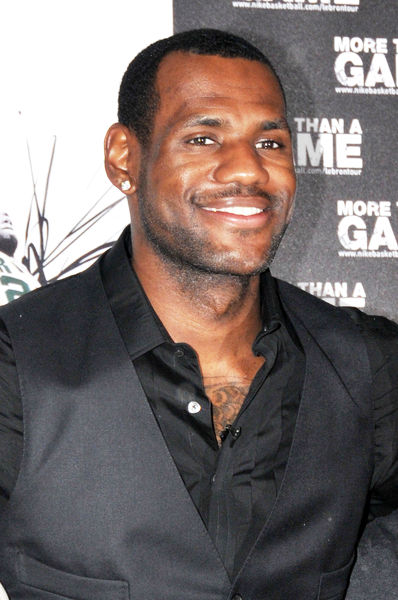
Enjoy, and please make sure to stop by early and often.
LeBron James is more than a great basketball player--he has the kind of talent that's an international currency. The guy is 6'8", 250 lbs. of freakish athleticism who does everything well on a basketball court. He's Michael Jordan only bigger, stronger, and without the championship pedigree.
Like Jordan or Tiger Woods, James has mastered the art of being on his best behavior for the masses. We've seen him countless times on commercials, TV shows, and during his professional career. But we don't know him. We know him the same way we do our mailman or the counter guy at the deli. James plays the role of a basketball-playing, very marketable celebrity. And he does it exceedingly well.
The new documentary, More Than a Game, which profiles James' high school basketball days at St. Vincent-St. Mary in Akron, OH, offers us a peek into the making of James's world. Basketball has given him many things and has taken away some more, namely the chance to be a normal guy. He's been in PR mode since he was 17 years old. We're never going to know him, a revelation that's the movie's biggest asset and its biggest flaw.
Three of James's teammates on that dominant squad--Willie McGee, Sian Cotton, and Dru Joyce III--he had played with since age 10. That's when Dru's dad, Dru Joyce II, organized a youth basketball team that eventually competed for a national championship. The four boys became inseparable both on and off the court, so it was only logical that they ended up at the same high school. And it was only logical that Coach Dru, the group's patriarch, joined them, first as an assistant, then as the head coach.
When Coach Dru took over the squad, it wasn't the perfect blending of family and talent. Coach Dru was hard on his son, as he made up for their relationship by increasing his expectations. A new player, Romeo Travis, joined the fold sophomore year and his me-first attitude was a difficult fit. When the boys were juniors, their annihilation of teams and James's surging profile brought national attention. That also produced a toxic mixture of complacency and swagger that threatened everything.
The hook of Kristopher Belman's film is that he makes you care about everyone involved, not just James. Romeo's lone wolf attitude came from a transient childhood where he was forced to rely on himself. While Coach Dru was battling the media hype and inflated egos in his first season at the high school, he still had to learn about the game. (He admits that he coached basketball because his son loved the sport.) Sports meant more to Sian because he couldn't go to college without an athletic scholarship, and Willie, a gifted athlete, nobly faded to the background because of a career-altering injury.
Basketball and life were hard to separate for the boys, especially James, who faced a media blitz after making the cover of Sports Illustrated as a 17-year-old junior. The school wasn't ready for this, and neither was anyone else. At an age when most of us are worrying about the SATs, James became a national celebrity. His team's games--which were moved to bigger and bigger venues--were nationally televised. If the team was the Beatles, then James was John, Paul, and George, and the crazed fans reacted accordingly.
Inadvertently, the movie reveals why James maintains such a good poker face. Wouldn't you retreat further and further into a safe place, especially if your home life was less than secure and bored reporters were looking for a new angle on you? Seeing how it's probably the only thing you can rely on, wouldn’t you immerse yourself in your passion, your salvation? LeBron James had no choice but to become blandly charming and let his game do the talking. It's fitting that during his last game at St. Vincent-St. Mary while other players walked out with their families, James walked out with his teammates. It makes sense: They're the few people to know him before he became a brand name.
While it's well-filmed, exciting, and serves as a touching example of how sports matter, More Than a Game doesn't resonate. James, who executive produced, wants us to believe that he's giving us a chance to see his roots. But by showing us what amounts to a cinematic victory lap with personal touches (a tour of his old apartment; footage from home videos) he further cements his smooth façade. Besides, James is only 24 years old. He graduated from high school six years ago. That's not enough time to acquire a clear perspective on the past. All these loose ends say more about James, and the media-savvy attitude of today's professional athlete, than anything in the movie. We should be thankful James has given us anything remotely personal, and go back to enjoying the highlights. [PG]

No comments:
Post a Comment